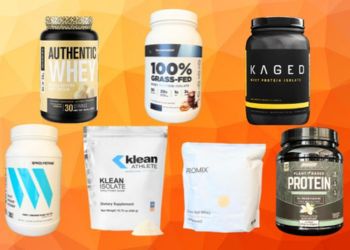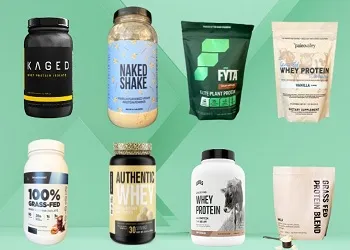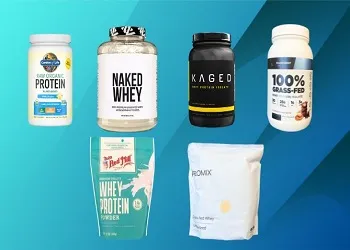Tryptophan (L-tryptophan), an essential amino acid, has long been linked with sleep and drowsiness, often cited as the reason behind the post-Thanksgiving meal lethargy leading many to ask the question, “Can tryptophan make you sleepy?” In this article, we’ll go through whether or not tryptophan can actually lead to drowsiness and why, discuss the tryptophan in turkey, and also touch on a bit of sleep science.
Table of Contents
Key Points
- Tryptophan is a precursor of serotonin and then melatonin which contributes to the sleep-wake cycle. However, carbohydrates are what actually incur the sleepiness associated with this amino acid rather than tryptophan itself.
- Several other protein sources are nearly as high in tryptophan as turkey.
- There are more effective ways to boost serotonin rather than focusing on consuming tryptophan.
Understanding Tryptophan
Tryptophan is one of the nine essential amino acids (EAAs), which means it cannot be produced by the human body and must be obtained through diet. It is found in various food sources, including turkey, chicken, milk, cheese, yogurt, eggs, and certain nuts and seeds. Tryptophan has several basic metabolic functions as it serves as a precursor to several important biomolecules, including serotonin, a neurotransmitter that plays a significant role in mood regulation, and melatonin, a hormone that regulates sleep-wake cycles.
Tryptophan to Serotonin: A Path to Sleepiness?
The link between tryptophan and sleepiness primarily revolves around its role in serotonin production. Tryptophan undergoes a series of biochemical transformations, first converting into 5-hydroxytryptophan (5-HTP) and then into serotonin. Serotonin, known for its mood-enhancing effects, is also a precursor to melatonin, the hormone directly involved in sleep regulation.
Melatonin: The Sleep Regulator

Melatonin, synthesized from serotonin, directly influences the sleep-wake cycle by signaling to the body that it is time to sleep. It is produced in the pineal gland of the brain, and its production is influenced by the light-dark cycle, with levels typically rising in the evening and falling in the morning. The conversion of serotonin to melatonin is crucial in understanding how tryptophan might contribute to sleepiness.
Dietary Tryptophan and Sleep
While it is true that tryptophan is a precursor to serotonin and melatonin, the common belief that consuming tryptophan-rich foods can lead directly to sleepiness is an oversimplification. The effect of dietary tryptophan on sleep has been a subject of research, but the results are not entirely conclusive. Studies have shown that while tryptophan supplements might have a mild sedative effect, the amount of tryptophan in food is generally not sufficient to produce a noticeable increase in sleepiness.
Tryptophan and Mood
This study examines how altering tryptophan levels, a precursor to serotonin, can impact mood and cognitive functions. It also explores the connection between the gut and the brain, suggesting that changes in gut health might influence mental health and brain disorders.
Gut microbiome research is constantly evolving, but this is another avenue that may explain tryptophan’s relationship to sleep, mood, and mental health. This is also another reason why the effect of tryptophan on sleep may vary greatly from person to person, as we each have a completely unique gut microbiome.
Turkey Talk: Is There Tryptophan in Turkey?
Dietary protein sources contain amino acids, otherwise known as the building blocks of protein. Specific proteins help repair and build muscle. That’s why there is such a focus for those engaged in strength training to consume enough protein or supplement with amino acids. Turkey does contain tryptophan, but it actually has only a bit more than chicken.
Is Turkey High in Tryptophan?
Tryptophan research is limited, but a common dose of tryptophan to improve sleep is between one and five grams for adults, so eating turkey may or may not make that much of a difference regarding sleep. It really depends on the person.
How much tryptophan is in turkey?
An article published in the British Medical Journal states that there is about 350mg in 115g (4oz) of turkey meat, the same as chicken and ground beef. Three to four ounces is a typical serving size.
Does deli turkey have tryptophan? Does ground turkey have tryptophan?
Deli turkey meat is more processed than other turkey meat, so it will naturally have less tryptophan. Ground turkey will have a similar amount, maybe a little less due to processing.
The Role of Carbohydrates
Interestingly, the consumption of carbohydrates alongside tryptophan-rich foods might play a role in the perceived increase in sleepiness. Carbohydrates can lead to a spike in insulin levels, which in turn causes other amino acids to be absorbed more rapidly than tryptophan, leaving higher relative levels of tryptophan in the bloodstream. This could potentially increase the amount of tryptophan available to cross the blood-brain barrier and lead to increased serotonin and melatonin production.
Why Does Thanksgiving Dinner Make You Sleepy?

The large meal that’s based around turkey on this yearly holiday is often associated with a nap or laziness. Much of this narrative is blamed on turkey due to its tryptophan content. As mentioned above, turkey doesn’t actually have that much more tryptophan than other protein-containing foods like milk, chicken, and cheese.
Another thing is that carbohydrates are usually paired alongside a Thanksgiving meal, and carbohydrates may be the real mechanism behind tryptophan’s connection to sleepiness. So if you’re feeling a food coma coming on after a big Thanksgiving meal, it may have just as much to do with the mashed potatoes as it does the turkey.
There are also other things to think about related to Thanksgiving that lead to drowsiness or lethargy. During the holiday season, several factors can contribute to feelings of tiredness.
Consuming large amounts of food, especially those rich in carbohydrates and fats, often leads to sleepiness. This effect typically occurs about an hour after eating, particularly when indulging in high glycemic foods which cause a rapid increase in blood sugar. This spike in blood sugar levels results in the body releasing more insulin, which can contribute to a feeling of fatigue.
Additionally, alcohol plays a significant role in making one feel tired. As a depressant, alcohol suppresses the nervous system, and this can induce a sense of sleepiness. The combined effects of overeating, particularly high-carb and high-fat foods, along with alcohol consumption, are common reasons for feeling unusually tired during the holiday festivities.
Psychological and Placebo Effects

The association between tryptophan and sleepiness may also be influenced by psychological factors. The expectation of feeling sleepy after consuming tryptophan-rich foods, like turkey during Thanksgiving, may contribute to the actual sensation of drowsiness. This placebo effect, combined with other factors such as the relaxing atmosphere and possible alcohol consumption, might play a significant role.
How to Avoid Thanksgiving Drowsiness
Remember, holidays are a time for rest, spending quality time with loved ones, and maybe a touch of over-indulgence. Don’t beat yourself up about taking an afternoon nap or two or feeling less than energetic around this time.
However, you may not want to feel overly sluggish during the holidays either. Stop eating when you feel full, limit alcoholic drinks or replace some with water, aim to keep a regular sleep schedule, and get outside and go for a leisurely walk—it may even be a nice family activity where everyone can join.
Tryptophan Supplements and Sleep
Supplements containing L-tryptophan or 5-HTP have been studied for their potential to aid sleep. 5-hydroxytryptophan (5-HTP) is an immediate precursor to serotonin and won’t be used for other bodily processes like tryptophan would. Some research suggests that these supplements may help in reducing the time it takes to fall asleep and improve sleep quality, particularly in individuals with mild insomnia or serotonin deficiencies. However, it’s important to approach supplementation cautiously, as high doses can have adverse effects and interactions with other medications.
Other Ways to Boost Your Serotonin Levels
If you’re having trouble getting enough quality sleep, supplements that impact serotonin may be something to investigate. However, before looking to supplements, there are other ways to boost serotonin and regulate sleep such as:
- Exercise
- Nature
- Mindfulness and meditation
- Eating a balanced diet
As you can see, serotonin levels are impacted by a number of factors, but the good thing is that we can control some of them. This further drives home the point that improving sleep quality requires a holistic approach. Then, if all else fails, it’s worth it to speak to your doctor or licensed healthcare professional about other options to help regulate your sleep.
How Sleep Works

Sleep is a complex and essential process for human health, intricately linked to the circadian rhythm, an internal biological clock that regulates the sleep-wake cycle. This rhythm typically has two peaks of sleepiness: the first peak occurs during the night, leading to deep sleep, which is crucial for physical restoration and memory consolidation.
As the night progresses, sleep cycles alternate between deep sleep and REM (rapid eye movement) sleep, with the latter being associated with dreaming and mental rejuvenation. The second peak in sleepiness often occurs in the afternoon, which is why many people experience a natural dip in alertness post-lunch. This afternoon slump is a normal part of the circadian rhythm, or sleep cycle, and can vary in intensity among individuals. This may be more or less intense depending on the food you eat, but it’s also not entirely your lunch’s fault.
Tryptophan, Diet, and Overall Health
Tryptophan’s role in sleep is just one aspect of its importance in a balanced diet. As an essential amino acid, it contributes to various bodily functions, including protein synthesis and the production of niacin, a vital B vitamin. Ensuring adequate tryptophan intake is part of maintaining overall health, which in turn can support better sleep quality.
Conclusion: Does Tryptophan Make You Sleepy?
The answer is nuanced. While tryptophan is a precursor to serotonin and melatonin, which are involved in sleep regulation, the direct impact of dietary tryptophan on sleepiness is not as significant as commonly believed. Factors such as carbohydrate intake, the placebo effect, and the overall context of consumption (like a relaxing holiday meal) also play a part in the sensation of drowsiness. Tryptophan’s importance in a healthy diet is undeniable, but its role as a natural sedative might not be as straightforward as popularly thought.
In conclusion, while tryptophan does contribute to the production of sleep-regulating hormones, consuming foods high in tryptophan won’t inherently make you feel sleepy.
Frequently Asked Questions
How much tryptophan does it take to fall asleep?
There is no standard dose for tryptophan, considering dietary supplements are not regulated by the FDA in the US. However, tryptophan supplements have been used at doses ranging from 1-5g for sleep (daily) without causing significant side effects.
Does tryptophan cause drowsiness?
Tryptophan supplements and 5-HTP supplements have been shown to cause mild sedative effects. Tryptophan from dietary sources is unlikely to contribute to drowsiness.
Is tryptophan a sleeping pill?
L-tryptophan is an amino acid found in food. It is available in supplement form to encourage sleep, but there is scant research to back this up. Other supplements and medications are better suited to help with sleep.
How does tryptophan make you happy?
Tryptophan is associated with improved mood due to its relationship with serotonin–which is a neurotransmitter that affects mood. There is limited evidence to suggest that tryptophan has a very significant effect on improved mood, however.
Does tryptophan in turkey make you sleepy?
It is a longstanding myth that the tryptophan found in turkey meat contributes to sleepiness. Seeing as turkey is also attached to large holiday meals, there are several other factors that are at play when it comes to drowsiness around this time of year. Also, there is not that much more tryptophan in turkey compared to other common animal protein sources.
Does turkey have melatonin?
Turkey contains the amino acid tryptophan which is converted to serotonin and then to melatonin. So no, turkey doesn’t have melatonin.














